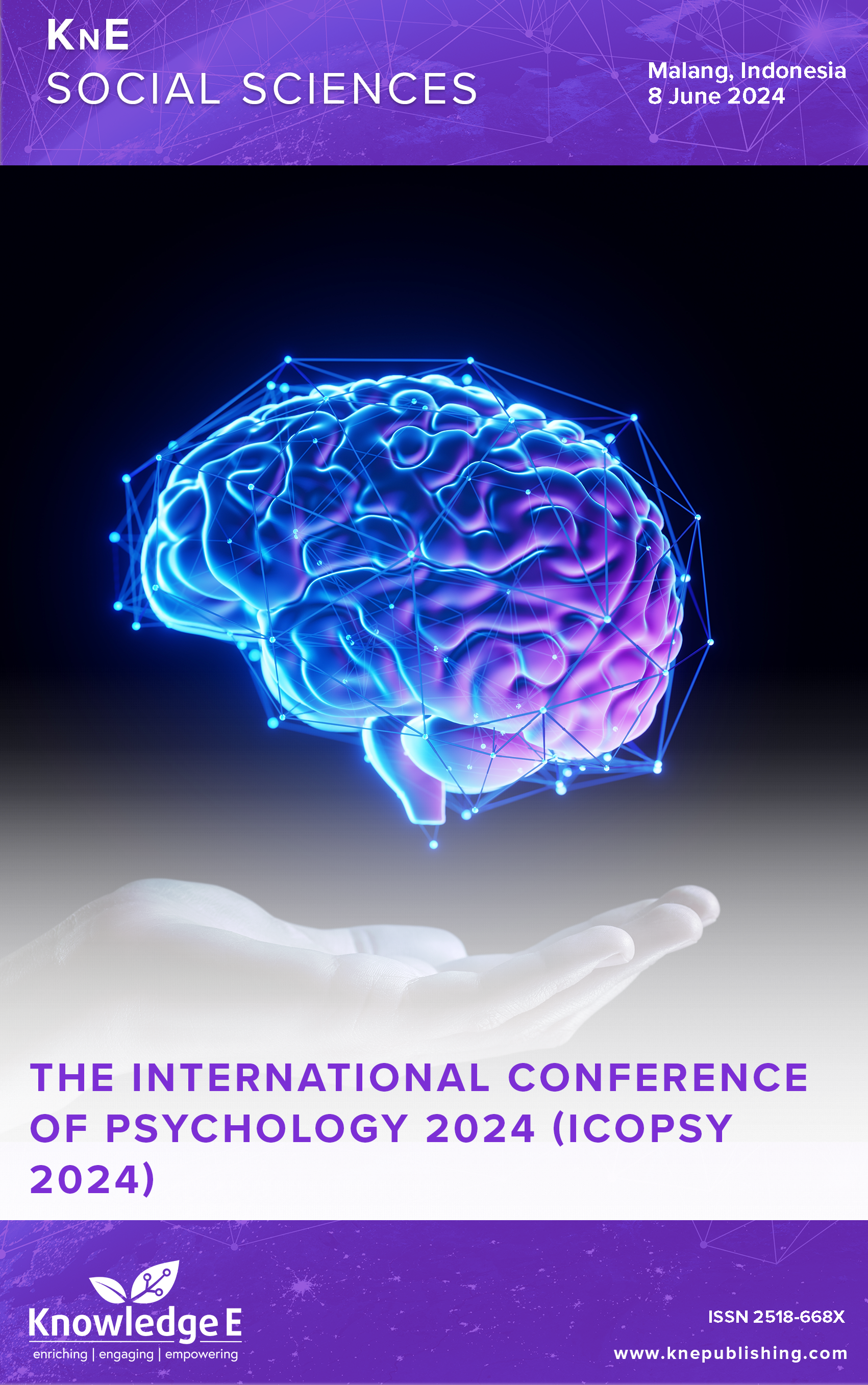Psychoeducation: Impact of Gadget Use on Early Childhood at PAUD TKM Al-Khoiriyah
DOI:
https://doi.org/10.18502/kss.v9i30.17519Abstract
This research aims to increase parents’ comprehension of the influence of gadget use on early development by providing psychoeducation to parents of TKM Al-Khoiriyah students. This study uses quantitative research methods with experimental techniques to view the differences in parental knowledge before and after psychoeducation is conducted. Data collection was done using a questionnaire of parents’ knowledge and efforts regarding the use of gadgets in preschool children. This instrument consists of five dimensions including 1) early childhood growth and development, 2) Screen time in children, 3) positive impact on gadget use, 4) negative impact of gadget use, 5) parental efforts in overcoming gadget use in children. Data analysis was carried out using Wilcoxon Signed Rank Tail. The results of the analysis stated that there were differences in knowledge among mothers after psychoeducation on the impact of gadget use on early childhood. The probability value shows that the p-value is 0.017 (p < 0.05).
Keywords: psychoeducation, gadget, early childhood
References
Jeyagowri R. Influence of Smart Gadgets on Pre-school Children. IARJSET. 2021;8(8): https://doi.org/10.17148/IARJSET.2021.8808. DOI: https://doi.org/10.17148/IARJSET.2021.8808
Andriani R, Basri B. The Effect Of Addiction To Playing Online Games On Learning Motivation In Students At Sdn Subangjaya 2, Sukabumi City. Risenologi. 2022;7 1a:77–83. DOI: https://doi.org/10.47028/j.risenologi.2022.71a.336
Anggraeni S. Pengaruh pengetahuan tentang dampak gadget pada kesehatan terhadap perilaku penggunaan gadget pada siswa SDN Kebun Bunga 6 Banjarmasin. Faletehan Health Journal. 2019;6(2):64–8. DOI: https://doi.org/10.33746/fhj.v6i2.68
Mukarromah T. Dampak penggunaan gadget pada perkembangan sosial anak usia dini di Dusun Setia Bumi Kecamatan Seputih Banyak. Institut Agama Islam Negeri Metro, Fakultas Tarbiyah dan Ilmu Keguruan, Jurusan Pendidikan Agama Islam. Skripsi; 2019.
Rowan C. (2013). The impact of technology on the developing child [internet]. US: The Huffington. http://www.huffingtonpost.com/crisrowan/technologychildrennegativeimpact_ b_3343245.html. Diakses pada 30 Maret 2018.
Hartini N. “Metodologi Pendidikan Anak dalam Pandangan Islam” (Studi tentang Cara-cara Rasulullah SAW dalam Mendidik Anak). Jurnal Pendidikan Agama Islam- Ta’lim. 2011;9(1):31–43.
Cartwright M. (2007). Psychoeducation among caregivers of children receiving mental health services [Ohio State University]. oai:etd.ohiolink.edu:osu1187029938
Supratiknya A. (2011). Merancang program dan modul psikoedukasi edisi revisi. Penerbit Universitas Sanata Dharma. https://repository.usd.ac.id/12880/
Yulianti, D. (2010). Penerapan Model Bermain Berbasis Kontekstual untuk Meningkatkan Minat Sains Siswa Sekolah Dasar. Lembaran Ilmu Kependidikan, 39(1).
Ribeiro JA, de Resende CM, Lopes AL, Mestriner W Jr, Roncalli AG, Farias-Neto A, et al. Evaluation of complete denture quality and masticatory efficiency in denture wearers. Int J Prosthodont. 2012;25(6):625–30.
Jasiah, Umul Khasanah, Wina Arsy, Nu Latifah, & Zulham. (2023, September 30). View of Improving Early Childhood Language Development through “Kiki Miu-Miu” YouTube Videos. https://journal.iaimnumetrolampung.ac.id/index.php/jcd/article/view/3780/1324 DOI: https://doi.org/10.25217/jcd.v3i2.3780
Pangastuti, R. (2017). View of Fenomena Gadget dan Perkembangan Sosial bagi Anak Usia Dini. 2(2), 165–174. https://doi.org/https://doi.org/10.51529/ijiece.v2i2.69.
Annisa N, Padilah N, Rulita R, Yuniar R. Dampak Gadget Terhadap Perkembangan Anak Usia Dini. Jurnal Pendidikan Indonesia. 2022;3(09):837–49. DOI: https://doi.org/10.59141/japendi.v3i09.1159
Zain ZM, Jasmani FN, Haris NH, Nurudin SM. Gadgets and Their Impact on Child Development. Proceedings. 2022;82(1):1. DOI: https://doi.org/10.3390/proceedings2022082006
Ayu IM, Titik R, Yuli S. Preschoolers’ mental health status based on their mobile gadget usage. J Phys Conf Ser. 2020;1469(1):012054. DOI: https://doi.org/10.1088/1742-6596/1469/1/012054
Fitriahadi EF, Tyastiti VH. THE IMPACTS OF THE USE OF GADGETS ON THE DEVELOPMENT OF CHILDREN 3-6 YEARS OF AGE. SEAJOM: The Southeast Asia Journal of Midwifery. 2020;6(1):1. DOI: https://doi.org/10.36749/seajom.v6i1.83
Pediatrics AA. of. (n.d.). American Academy of Pediatrics announces new recommendations for children’s media use. Retrieved May 10, 2024, from https://medicalxpress. com/news/2016-10-american-academy-pediatrics-children-media.html
Cho KS, Lee JM. Influence of smartphone addiction proneness of young children on problematic behaviors and emotional intelligence. Comput Human Behav. 2017;66(C):303–11. DOI: https://doi.org/10.1016/j.chb.2016.09.063
Azamiah MZ, Agustiani H. Program Psikoedukasi Penggunaan Gadget pada Anak Usia Dini. Murhum : Jurnal Pendidikan Anak Usia Dini. 2023;4(1):234–44. DOI: https://doi.org/10.37985/murhum.v4i1.197
Indonesia BP. (n.d.). Statistik Telekomunikasi Indonesia 2022. Retrieved January 7, 2024, from https://www.bps.go.id/id/publication/2023/08/31/ 131385d0253c6aae7c7a59fa/statistik-telekomunikasi-indonesia-2022.html
Trinika Y, Nurfianti A, Abror I. Pengaruh penggunaan gadget terhadap perkembangan psikososial anak usai prasekolah (3-6 tahun) di TK Swasta Kristen Immanuel tahun ajaran 2014-2015. Jurnal Proners. 2015;3(1):1–9.

